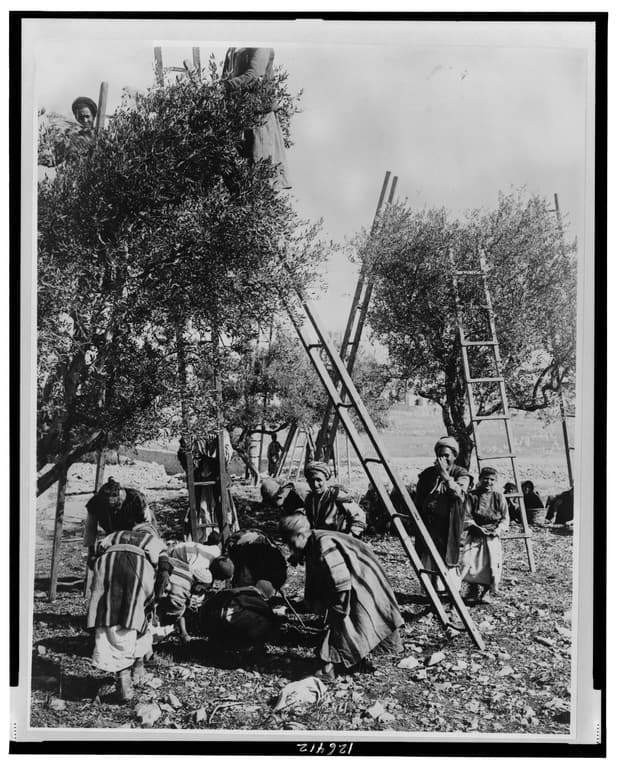



Where once waving the olive branch was a symbolic rapprochement for peace and cessation of all enmity, in the context of the ongoing Gaza conflict this phrase is lit even more ironically. The irony works because as Al Jazeera and other news sources have been regularly reporting, the cutting down of olive trees belonging to Gazan farmers by the Israelis has been nothing but obliterating their visible and entrenched cultural heritage for millennia. According to reports, in the West Bank, Palestinian olive growers are not able to cultivate their land or even access it, leaving settlers from Israel free to burn their crops. Palestine isn’t a huge supplier of olive oil to the world, but it means everything to the farmers in the war-torn region. Little wonder then that a BBC article called olive oil from the West Bank “perhaps the most political food in the world.”
 Farmers picking olives in Palestine sometime between 1880 and 1922. (Image from Frank and Frances Carpenter Collection via Wikimedia Commons)
Farmers picking olives in Palestine sometime between 1880 and 1922. (Image from Frank and Frances Carpenter Collection via Wikimedia Commons)
But it is not only in Gaza where trees have been felled. The global agromafia, keen on making a quick buck in view of low production thereby, has also been razing trees in Spain and Greece, and with deleterious economic consequences, since olive oil for the rest of the world is just an age-old cooking medium.
Olive oil, a staple of cuisines across the Levant and the Mediterranean, has become a prima donna across the world. It swept onto the celebrity and health faddist firmament with its antioxidant mythology in tow in the 1980s with TV chefs endorsing it by the gallon. The cognoscenti, enamoured of the high vegetable plus fruit Mediterranean diet and the similar Japanese Okinawa diet, have used generous libations of this golden elixir touted across aeons from Homer to Hippocrates as the near perfect anti ageing alembic. High omega 3 fatty acid content and a pungent taste, said the nutrition high priests, were good for us - who were used to sunflower and soybean oils. Instagram merely amplified these heart healthy monounsaturated fat benefits with a million articles re-echoing recipes and telling the hoi polloi to make it a must-have on their monthly grocery list.
Sadly with droughts in Spain, which produced 50 percent of the world's olive oil and changing climate patterns, production has dwindled, sending prices spiralling over 115 percent up in the last two years. This raises a real issue. With rising prices and shortages, is the olive oil we actually consume simply fake or even safe? Estimates suggest that 80 percent of the oil imported into the US may be mislabeled, dilated or outright fake. From fake labelling to free theft, olive oil is in question for both its affordability and integrity. Extra virgin olive oil (EVOO), the highest-grade oil, often gets adulterated with vegetable oils like soybean or sunflower oils or lampante oils. This reduces costs for unscrupulous sellers while fooling consumers who pay a premium for purity.
Refining cheaper oils to remove colour and odour allows them to mimic genuine EVOO, further blurring the lines for unsuspecting buyers. This has been tarnishing the reputation of the industry and eroding consumer trust. The price of deceit is more than just money. Beyond the financial implications, users miss out on health benefits of olive oil.
Compounding the issue is the alarming rise in olive tree theft and destruction. Olive trees play a vital role in soil conservation, biodiversity and cultural mythology. Some trees are thousands of years old. Most importantly, this also devastates the livelihood of small and big farmers. The consequences of this rampant tree cutting are far-reaching, as destroying them takes a domino effect since olive trees take many decades to mature to become high yielding.
The skewed market environment is particularly stark in view of trading practices in other food segments that are pressing for ethical sourcing and marketing. Liquid gold, as this oil has been labelled, is now inching towards real gold prices! Deceitful practices impact the livelihoods of honest farmers who struggle to compete with unfair trade practices. Behind every bottle lies a story of supporting ethical production of this prized product.
Yet, beyond the economics, it is the story of the olive farmer in the West Bank that is most poignant. For many of them olive oil harvesting is the only source of income and a bond with their antiquity. The war has ended both leaving them bereft of the vital link every farmer has with his land.
Discover the latest Business News, Sensex, and Nifty updates. Obtain Personal Finance insights, tax queries, and expert opinions on Moneycontrol or download the Moneycontrol App to stay updated!
Find the best of Al News in one place, specially curated for you every weekend.
Stay on top of the latest tech trends and biggest startup news.